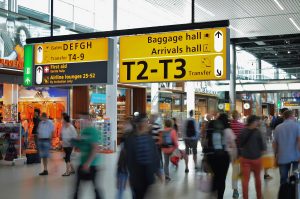
How are compensation amounts calculated (e.g., distance, length of delay, company)?
Every year, thousands of travelers are faced with a frustrating reality: that of a cancelled flight. When this happens in Canada, the initial disappointment can be mitigated by the prospect of compensation. But how is the latter calculated? The answer is not always simple and depends on multiple factors.
Canadian civil aviation regulations stipulate that air passengers are entitled to certain compensation when their flight is cancelled or delayed for reasons that are the airline’s responsibility. However, the calculation of compensation amounts is not a uniform process; It varies according to specific criteria such as the distance of the flight, the length of the delay and the policies specific to each airline.
The basics of compensation
When a flight is cancelled in Canada, passengers may be entitled to compensation under the Air Passenger Protection Regulations (APPR). This regulatory framework defines the obligations of air carriers towards their customers and specifies the conditions for compensation. In general, compensation is based on the inconvenience suffered by the passenger; Thus, the longer the delay and the greater the expected distance of the flight, the more the compensation tends to increase.
To be eligible for compensation, the delay or cancellation must be within the airline’s control and not be caused by extraordinary circumstances (such as adverse weather conditions or medical emergencies). If these conditions are met, the amount of the allowance will be calculated according to an established scale: $400 or $125 for delays of three to six hours; $700 or $250 for those between six and nine hours; and $1000 or $500 for delays of nine hours or more (Large or small airline).
Distance and time: two key factors
Distance is not a factor in determining the amount of compensation under the APPR. Regardless of the distance of the flight, the amount of compensation depends on the length of the delay at the final destination.
The length of the delay has a direct impact on the amount allocated. Minor delays may result in only token compensation or even no compensation at all if the airline manages to reschedule another flight quickly. On the other hand, when delays last for several hours or even days, they can cause major disruptions to the passenger’s travel plans – which is reflected in increased compensation.
Company-specific policies
Airlines each have their own policies when it comes to compensating their customers for a canceled flight. While these policies must meet the minimum requirements set out in the APPR, some companies offer additional compensation in the form of travel credits or additional services (such as access to VIP lounges).
Passengers affected by a cancellation should therefore carefully consult the terms and conditions of the ticket purchased as well as the specific policy of their carrier. It is not uncommon for some travelers to be able to benefit from additional benefits simply by knowing their rights well.
In addition, it is also important for customers affected by such an inconvenience to quickly start their claim for compensation with the company concerned. The delay between the disruptive event and the claim can influence not only how quickly they receive their compensation but also potentially how much it will be…
Claim procedure
The process of claiming compensation for a cancelled flight usually begins with direct communication with the airline concerned. Passengers will be required to provide all necessary information relating to their booking as well as a detailed description of the damage suffered.
Airlines often have an online complaint form where you will need to enter your personal information and information about the disrupted flight (flight number, date, etc.). It is advisable to keep all travel-related documents (electronic or paper boarding passes; receipts; confirmations) as you may be asked to do so as additional proof during the process.
If after submitting your request you are not satisfied… You then have the right to escalate your complaint to the Canadian Transportation Agency – the agency responsible for administering the APPR – who will review your case and decide on just cause compensation.
Factor | Criteria | Indicative amount (CAD) | Conditions / Important Notes |
Length of Arrival Delay (Major Companies) | 3-6 hours | $400 | Delay attributable to the company, except for force majeure or safety reasons. |
6-9 hours | $700 | Ditto. | |
> 9 hours | $1,000 | Ditto. | |
Length of Delay on Arrival (Small Companies) | 3-6 hours | $125 | Attributable delay, reduced scale. |
6-9 hours | $250 | Ditto. | |
> 9 hours | $500 | Ditto. | |
Company-specific policies | Travel credits, upgrades, additional services | Variable, sometimes higher than APPR | Some companies offer more than the legal minimum. |
Claim procedure | Contact Company | Form + documents (ticket, proof of delay) | Response within 30 days; possibility of recourse to the OTC. |
Final Considerations
Understanding how compensation for cancelled flights in Canada is calculated can seem complex, but it’s essential for any traveller who wants to assert their rights. It is therefore always advisable to stay informed about the latest regulatory updates that could influence your rights as a consumer. In short: keep your travel documents in order; Be proactive in your dealings with airlines. and do not hesitate to call on the competent authorities if necessary. Armed with this knowledge… Your journey towards fair compensation will be greatly facilitated despite the hazards inherent in the exciting but sometimes unpredictable world of air transport.


